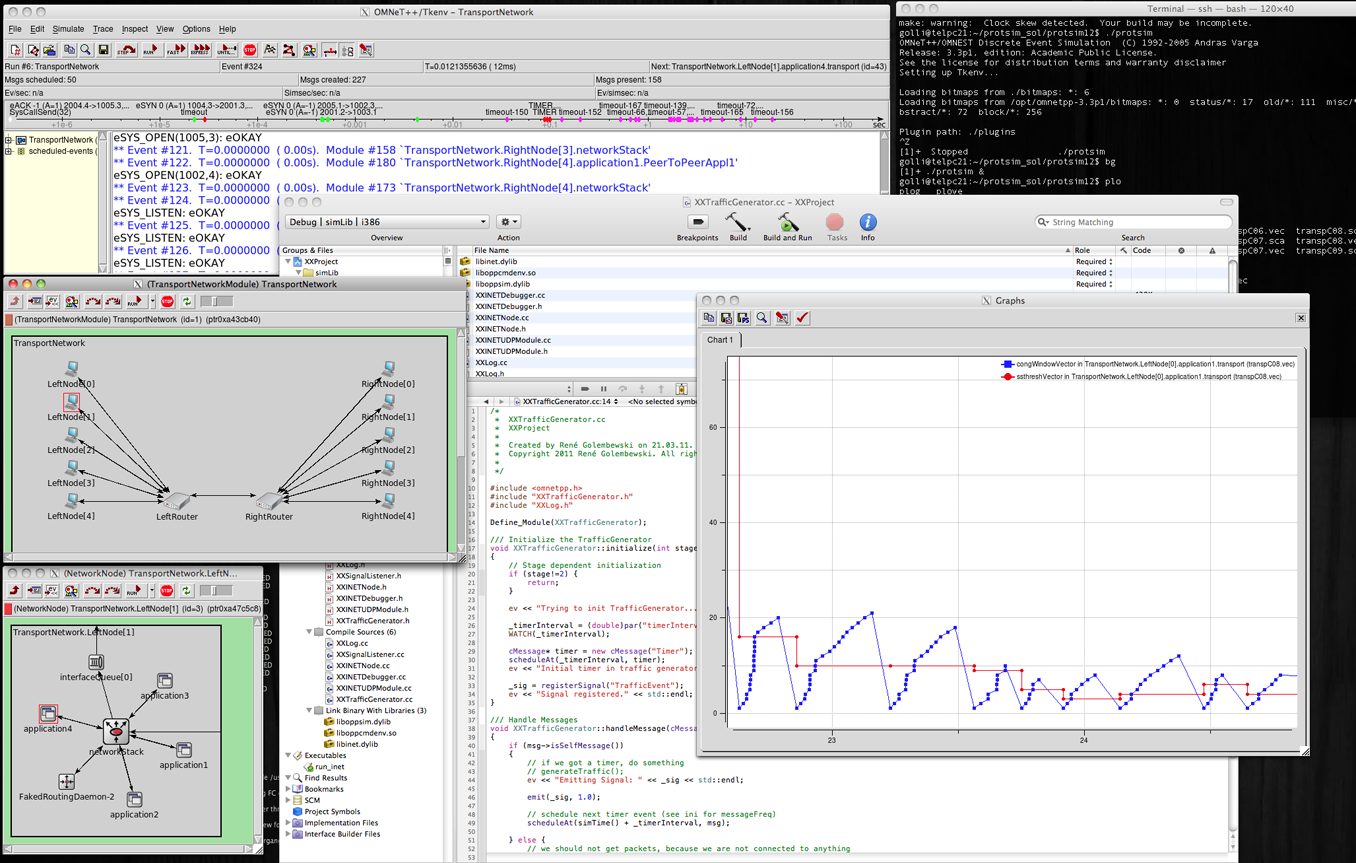Study programs
Computer science, engineering computer science, business computer science
(There is no restriction to a study program from our side. If your examination office gives you credit for this seminar, you are welcome).
Supervisor
Dr.-lng. Michael Roßberg
Content
Simulation is an important tool in the design and evaluation of communication protocols, since protocol behavior and critical performance metrics often cannot be adequately evaluated using other techniques before a protocol is introduced on a large scale. In this project seminar, basic protocol mechanisms such as packet forwarding, routing, error control, and flow and congestion control will be simulated so that the main concepts used in the Internet can be vividly experienced and experimentally investigated. The programming will be done with the open source tool OMNeT++ in the programming language C++ (basic knowledge of Java should be sufficient if you are willing to learn C++).
Recommendation
We recommend to do this seminar at the earliest in the 2nd FS, so that knowledge from the lectures "Algorithms and Programming" as well as "Telematics 1" is available. If you do this seminar without any basic knowledge in C++, please plan more time in advance to work on the tasks and to learn the programming language. The preparation time for each seminar can be estimated with about one hour.
It is recommended to attend the lecture Telematics 2/Performance Evaluation, since the concepts of simulation and the tools used in the project seminar are covered there. At the beginning of the first seminar, basic knowledge of simulation technology and the tools used is absolutely necessary. The self-study material given on this page should be used to acquire this knowledge. For the first seminar all material (except Chapter 5: Obtaining Data) is relevant.
Enrollment
There will be an introductory meeting on Thursday, 20/10/2022 at 15:00 in Zusebau room 1020, where you can enroll and where a weekly common date will be arranged. Details can be found in Moodle.
Dates and location
By arrangement
Procedure
The solutions (pdf) of the preparatory exercises have to be sent to the seminar leader via email one day before the seminar. The solutions of the assignment sheets have to be handed in one lab date after the corresponding project seminar.
Working environment
To check out the materials, you need SVN software on your computer. Under Debian/Ubuntu it is sufficient to enter the command "sudo apt-get install subversion" on the command line; for this you need administrator rights. Under OSX you can use e.g. the tool "svnX" (graphical). Then run the following command in your user directory:
svn co telematik.prakinf.tu-ilmenau.de/svn/Projekte/protsim
You will receive the access data from your supervisor. Familiarize yourself with the contents of the downloaded folder. Here you will also find the task sheets in English and German. Documentation on Subversion can be found at [SVN11].
Instructions for the installation as PDF: GermanEnglish
Please note that all binding information is primarily located in the respective Moodle course.
Topics
PDF file | | Content |
|---|
Project 1 | | The simulation environment, introduction |
Project 2 | | Forwarding, shortest path routing, metrics |
Project 3 | | Random Routing, Backward Learning, Flooding |
Project 4 | | Distance Vector Routing |
Project 5 | | Link State Routing, Dijkstra |
Project 6 | | FIFO-Queue, measurement of statistical variables |
Project 7 | | Transient detection, confidence intervals, |
Project 8 | | ARQ Send and Wait |
Project 9 | | Go Back N |
Project 10 | | Connection and disconnection |
Project 11 | | State machine and Go Back N, flow control |
Project 12 | | Congestion control |
| | Alternate dates if required |
You can perform all experiments remotely on our PCs in the computer pool and therefore do not need to install any software to complete the tasks.
Literature
[Wolf09] | | Jürgen Wolf. C++ from A to Z. 2009. galileo press |
[WGG10] | | K. Wehrle, M. Günes, J. Gross. Modeling and Tools for Network Simulation. Springer Berlin Heidelberg, 1st Edition, 2010. |
[SVN11] | | http://svnbook.red-bean.com/nightly/de/svn-book.pdf |
[Tan10] | | A.S. Tanenbaum. Computer Networks. 5th edition, Prentice Hall, 2010.one of the most widely read standard textbooks on computer networks. |
[Var11] | | A. Varga. OMNeT++: Object-Oriented Discrete Event Simulator. http://www. omnetpp.org/The official web site for OMNeT++. Includes links to download the software as well as the reference manual (User Manual, API Documentation). |
Self-study material
Completion
Successful participation in the course will be confirmed by regular acceptance of the simulation programs to be created and project protocols to be handed in. Regular participation in the course is a necessary prerequisite for this. Each project seminar includes a thorough preparation and the solution of the preparation tasks. We reserve the right to check this through oral consultations.
At the end of the semester, there will be a short final discussion with the supervisor in which the final grade will be determined, which consists of the performance in the seminar and the performance in the discussion. If all assignments have been successfully completed, the course is passed in all cases.


